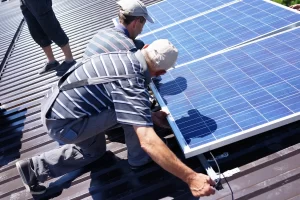Are you looking for a sustainable and cost-effective way to power your home? Look no further than the sun! Solar power is becoming increasingly popular as a renewable energy source for homes, providing numerous benefits for both the environment and your wallet.
Solar-powered homes are a growing trend, and for good reason. Not only do they reduce carbon emissions and help combat climate change, but they can also save homeowners money on their electricity bills. In this article, we’ll explore the benefits of solar power, how it works, and what you need to know to make the switch to a solar-powered home.
Benefits of Solar Power for Homes
The benefits of solar power for homes are numerous. Here are just a few:
- Lower electricity bills: By generating your own electricity, you can reduce your reliance on the grid and lower your electricity bills.
- Increased home value: Solar panels can increase the value of your home, making it a more attractive option for potential buyers.
- Environmental benefits: Solar power is a clean, renewable energy source that doesn’t produce any greenhouse gas emissions.
- Energy independence: By generating your own electricity, you can become less reliant on the grid and the fossil fuels that power it.
 How Solar Power Works
How Solar Power Works
Solar power works by harnessing the energy of the sun and converting it into electricity. This is done through the use of solar panels, which are made up of photovoltaic cells. When sunlight hits these cells, it excites electrons, creating a flow of electricity. This electricity is then sent to an inverter, which converts it into the type of electricity used in your home.
There are two main types of solar panel systems: grid-tied and off-grid. Grid-tied systems are connected to the electricity grid, allowing you to use any excess electricity you generate and sell it back to the utility company. Off-grid systems, on the other hand, are not connected to the grid and require battery storage to store excess electricity for later use.
Making the Switch to a Solar-Powered Home
If you’re interested in making the switch to a solar-powered home, there are a few things you’ll need to consider.
- Your home’s energy needs: Before installing solar panels, it’s important to determine your home’s energy needs. This will help you determine how many panels you’ll need to generate enough electricity to power your home.
- Your location: Your location plays a big role in how much energy your solar panels can generate. If you live in a sunny location with few clouds, your panels will generate more energy than if you live in a cloudy location.
- The cost: While the cost of solar panels has decreased in recent years, it’s still a significant investment. It’s important to weigh the upfront costs against the long-term savings.
- Installation: Solar panel installation can be complex and should be done by a licensed professional. Make sure you find a reputable installer who is familiar with your local regulations and requirements.
Solar power is a sustainable and cost-effective way to power your home. By harnessing the power of the sun, you can reduce your reliance on the grid, save money on your electricity bills, and help combat climate change. If you’re considering making the switch to a solar-powered home, be sure to do your research and find a reputable installer who can help guide you through the process.
So, are you ready to make the switch to a solar-powered home? What questions do you have about solar power and its benefits? Let us know in the comments below!












Leave a Reply